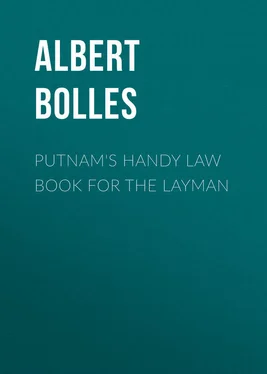Albert Bolles - Putnam's Handy Law Book for the Layman
Здесь есть возможность читать онлайн «Albert Bolles - Putnam's Handy Law Book for the Layman» — ознакомительный отрывок электронной книги совершенно бесплатно, а после прочтения отрывка купить полную версию. В некоторых случаях можно слушать аудио, скачать через торрент в формате fb2 и присутствует краткое содержание. Издательство: Иностранный паблик, Жанр: foreign_antique, foreign_prose, на английском языке. Описание произведения, (предисловие) а так же отзывы посетителей доступны на портале библиотеки ЛибКат.
- Название:Putnam's Handy Law Book for the Layman
- Автор:
- Издательство:Иностранный паблик
- Жанр:
- Год:неизвестен
- ISBN:нет данных
- Рейтинг книги:5 / 5. Голосов: 1
-
Избранное:Добавить в избранное
- Отзывы:
-
Ваша оценка:
- 100
- 1
- 2
- 3
- 4
- 5
Putnam's Handy Law Book for the Layman: краткое содержание, описание и аннотация
Предлагаем к чтению аннотацию, описание, краткое содержание или предисловие (зависит от того, что написал сам автор книги «Putnam's Handy Law Book for the Layman»). Если вы не нашли необходимую информацию о книге — напишите в комментариях, мы постараемся отыскать её.
Putnam's Handy Law Book for the Layman — читать онлайн ознакомительный отрывок
Ниже представлен текст книги, разбитый по страницам. Система сохранения места последней прочитанной страницы, позволяет с удобством читать онлайн бесплатно книгу «Putnam's Handy Law Book for the Layman», без необходимости каждый раз заново искать на чём Вы остановились. Поставьте закладку, и сможете в любой момент перейти на страницу, на которой закончили чтение.
Интервал:
Закладка:
He has no authority to warrant the quality of property sold except custom or authority is expressly given to him. Nor is he an insurer of the safety of the goods entrusted to him for sale; he must however use ordinary and reasonable care in keeping them. Lastly, an auctioneer should disclose his principal and contract in his name. If one bought property therefore supposing it belonged to A, when in fact it belonged to B, through any manipulation of the auctioneer, the bidder would not be bound.
Automobile.– The members of the public have a right to use the public avenues for the purpose of travel and of transporting property: nor has the driver of horses any right in the road superior to the right of the driver of an automobile. Each has the same rights, and each is equally restricted in exercising them by the corresponding rights of the other.
Again, the public ways are not confined to the original use of them, nor to horses and ordinary carriages. "The use to which the public thoroughfare may be put comprehends all modern means of carrying including the electric street railroad and automobile." It has been declared that the fact that motor vehicles may be novel and unusual in appearance and for that reason are likely to frighten horses which are unaccustomed to see them, is no reason why the courts should adopt the view of prohibiting such machines.
The general rule is that all travelers have equal rights to use the highways. An automobile therefore has the same rights and no more than those of a footman.
The mere fact that automobiles are run by motor power, and may be operated at a dangerous and high rate of speed, gives them no superior rights on the highway over other vehicles, any more so than would the driving of a race horse give the driver superior rights on the highway over his less fortunate neighbor who is pursuing his journey behind a slower horse.
There is no authority or power in the state to exclude non-resident motorists from the public ways, nor have the states power to place greater restrictions or burdens on non-resident automobilists than those imposed on their own citizens.
A license to operate an automobile is merely a privilege. It does not constitute a contract, consequently it does not necessarily pass to a purchaser of the vehicle, and may, for a good reason, be revoked. Moreover the charge imposed for the privilege of operating a motor on the highway is not generally considered a tax, only a mere license or privilege fee.
An automobile may be hired from the owner. This is called in law a bailment. The bailor is not responsible generally for any negligence of the hirer in operating the car. Nor is the rule changed should the hirer be an unskilled person, unless he was an immature child or clearly lacking in mental capacity, or was intoxicated. Where the owner of an automobile delivered it to another by agreement, who was to pay the purchase price from the money derived from its use, and thereafter had complete control of the machine, his negligence could not be charged to the seller.
Again, where an automobile is hired and the chauffeur is also furnished by the owner, who pays him for operating the car, and the hirer has no authority over him except to direct his ways of going, the chauffeur is regarded as the servant of the owner. He, therefore, and not the hirer is responsible for the negligence of the chauffeur. Of course, the rule would be changed if the hirer assumed the management of the car: then the hirer alone would be liable for the chauffeur's negligence.
A party who hires an automobile from another is bound to take only ordinary care of it and is not responsible for damage whenever ordinary prudence has been exercised while the car was in his custody. If lost through theft, or is injured as a result of violence, the hirer is only answerable when these consequences were clearly the result of his own imprudence or negligence. The hirer though must account for the loss or injury. Having done this, the proof of negligence or want of care is thrown on the bailor.
If the hirer should sell the automobile without authority to a third party, the owner or bailor may bring an action against even an innocent purchaser who believed that the hirer had the title and power to sell.
There is an implied obligation on the hirer's part to use the car only for the purpose and in the manner for which it was hired. And if it is used in a different way and for a longer time, the hirer may be responsible for a loss even though this was inevitable.
Suppose the hirer misuses the car, what can the owner do? He can repossess himself, if this can be done peaceably, otherwise he must bring an action for the purpose. As the hirer acquires a qualified title to the property, he can maintain an action against all persons except the owner, and even against him so far as the contract of letting may set forth the relations between them.
When an owner or hirer undertakes to convey a passenger to a specified place and, while on the way, the car breaks down, if it cannot be properly mended at the time and the owner or hirer is able to furnish another, the law requires him to do so and thus fulfil his contract.
"The owner of a motor vehicle," says Huddy, "is of course entitled to compensation for the use of the machine. If a definite sum is not stated in the contract between the parties, there arises an implied undertaking that the hirer shall pay a reasonable amount. One who uses another's automobile without consent or knowledge of the owner, may be liable to pay a reasonable hire therefor. In case the hirer is a corporation, there may arise the question whether the agent of the company making the contract has authority to bind the company. Where a machine is hired for joy riding on Sunday, it has been held that the contract is illegal and the hirer cannot recover for the use of the automobile."
The speed of automobiles along the public highways may be regulated by law. A municipality may forbid the use of some kinds of motor vehicles on certain streets, but it cannot broadly exclude all of them from all the streets. The rules regulating travel on highways in this country are called, "the law of the road." The object of these rules is to prevent collisions and other accidents, which would be likely to occur if no regulations existed.
A pedestrian who is about to cross a street may rely on the law of the road that vehicles will approach on the proper side of the street. This rule however does not apply to travelers walking along a rural highway. Huddy says: "When overtaking or meeting such a person, it is the duty of both the pedestrian and the driver of the machine to exercise ordinary care to avoid a collision, but no rule is, as a general proposition, definitely prescribed as to which side of the pedestrian the passage shall be made."
The law of the road requiring vehicles to pass each other on the right, contrary to the English custom, has been reënforced in many or all the states by statutory enactments, and applies also to automobiles. When, therefore, two vehicles meet and collide on a public highway, which is wide enough for them to pass with safety, the traveler on the wrong side of the road is responsible for the injury sustained by the other. But a traveler is not justified in getting his machine on the right-hand side of the road and then proceeding regardless of other travelers; on the contrary, the duty of exercising reasonable care to avoid injuries to others still continues.
Not only must each one pass to the right, but each must pass on his own side of the center line of the highway, or wrought part of the road. And when the road is covered with snow, travelers who meet must turn to the right of the traveled part of the road as it then appears, regardless of what would be the traveled part when the snow is gone. After passing the rear of the forward vehicle an automobilist must exercise reasonable care in turning back toward the right into the center of the highway, and if he turns too soon he may be liable for damages caused by striking or frightening the horses. "If two vehicles meet in the street, it is the duty of each of them, as seasonably as he can, to get each on his own right-hand side of the traveled way of the street."
Читать дальшеИнтервал:
Закладка:
Похожие книги на «Putnam's Handy Law Book for the Layman»
Представляем Вашему вниманию похожие книги на «Putnam's Handy Law Book for the Layman» списком для выбора. Мы отобрали схожую по названию и смыслу литературу в надежде предоставить читателям больше вариантов отыскать новые, интересные, ещё непрочитанные произведения.
Обсуждение, отзывы о книге «Putnam's Handy Law Book for the Layman» и просто собственные мнения читателей. Оставьте ваши комментарии, напишите, что Вы думаете о произведении, его смысле или главных героях. Укажите что конкретно понравилось, а что нет, и почему Вы так считаете.












